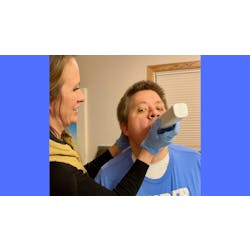By Nancy W. Burkhart, BSDH, EDD
Sheryl Sandberg's book "Lean In" has received much press since its publication in early 2013. I pause this month from oral pathology to comment on the 100th anniversary of dental hygiene. This book is essentially written for the woman in the workplace. Sandberg explores why women pursue the careers they do but also why they fail to "lean in." The meaning of "lean in" denotes the reluctance of women to go forward in their careers and instead accept what they are given in the work force. The book may be especially relevant for career choices that are primarily dominated by women. Dental hygiene and nursing careers have been predominately dominated by women since their inception. Both professions have had their share of issues with respect in society, a lack of recognition, and low monetary gains during the past decades. Unlike many other professions, the ratio of women to men still remains very skewed in both careers.
As Sandberg points out, men tend to view the monetary rewards as primary and select careers that compensate on a higher scale. Men with degrees also tend to pursue careers in which advancement is expected, and this results in much higher levels in salary with the possibility of unlimited promotions to higher levels.
Sandberg also quotes Alice Walker saying, "The most common way that people give up their power is by thinking they don't have any."
This thought follows the fact that men tend to gravitate toward being in the higher level positions as most favorable for further advancement -- perhaps not even considering positions that provide "glass ceiling" limits initially. Dental hygiene and nursing careers do provide some advancement for those who teach, conduct research, or those who have advanced degrees, those who develop a service or product (the entrepreneur), or other complementary disciplines.
Generally, the dental hygienist who stays in the clinical realm of a dental office realizes a cap on the monetary gain after a period of years with little to no long-term advancement within the office hierarchy. The dentist owns the practice and will always be in ultimate control of not only monetary advancement but also job level status and duties of personnel. Of course, dentists and practice owners also assume most -- and in many cases all -- of the liability in what happens in their office as well. Some potential practice owners do not want the liability even if the possibility of ownership exists.
Both dental hygiene and nursing have filled some needs for women such as work schedule flexibility and being able to take time off for childcare. The freedom/flexibility to work and taking time off when needed has been seen by many as a real asset in selecting dental hygiene as a career, whether long-term or jobs that are seen as short-term for those who do not return to the office after having children. Dental hygiene is also perceived as a profession that the hygienist can return to after children are more self-sufficient in later years. Sandberg states that this is not considered an issue for men when selecting a career.
It is this perception that Sandberg is questioning, and she suggests that women need to "lean-in" and just go forward early on instead of viewing their position as temporary or short term while they wait for other "life events" to occur. One comment offered, "If you are offered a seat on a rocket ship, don't ask which seat, just get on."
Her premise is that if a good career is not developed early on, the question of whether to return to work is not given equal weight when a decision has to be made. Work fulfillment is just not seen as enticing, nor is it profitable in many cases with regard to dental hygiene.
Sandberg also believes that women in the workforce have a difficult time speaking authentically. By that, she believes that women hedge their statements because of the fear that they will be labeled as not being a team player, seen as negative and as a nag. Women also fear that they will call attention to themselves, and this may open them up to attack. She makes the point that psychologists who study power dynamics find that people in low-power positions are more hesitant to share their views, and they tend to hedge their statements when they do share.
This is especially true for hygienists who are seen as limited "employees" of the dental practice. Previous research studies have also shown that individual workers who have "low control in the work environment" also have more chronic health issues. Having a sense of control over one's environment is crucial to long-term psychological and physical health. For example, low back pain has been associated with a lower control over one's environment. Sandberg states that women view their attributes more as luck while men attribute their success to core skills. Along the same lines, Sandberg believes that women tend to "downplay" their achievements and question their abilities while men emphasize their achievements. These characteristics have been fostered through socialization. Sandberg also cites statistics that suggest women do not apply for positions if they think that they cannot meet 100 percent of the abilities required for the job, where men apply if they think they meet 60% of the requirements. She suggests that women need to shift their thinking from "I am not ready to do that" to "I want to do that, and I'll learn by doing it."
Sandberg's "Lean In" book addresses mentoring throughout the book. She emphasizes that women tend to look for the mentor that can help them succeed where men tend to view their own attributes as their strengths and connect with others based on these attributes. Instead of searching for a mentor, Sandberg suggests that women seeking mentorship find that the strongest relationships spring out of a real and often earned connection felt by both sides.
Sandberg does believe that mentors select each other, and this concept does follow the research related to mentoring. She also states the fact that we may have sent the wrong message to women regarding an all-out attempt to secure a mentor. The focus should be to "excel and you will get a mentor." Sandberg also says that many women in business will sabotage other women, and that there is a "queen bee" attitude of keeping others at lower levels in order to rise in the ranks. Since women dominate dental hygiene, mentoring by others in higher levels is especially important to the advancement of an individual.
With the Sandberg book in mind, and the dental hygiene anniversary upon us this year, I decided to interview some hygienists (see related sidebar for directions on RDHmag.com to view the interviews) that I do admire and ask them where they believe the profession is headed in the years to come. The interviewees range from educators, clinical practitioners, and two of these hygienists have invented a dental product and rightfully may be called an inventor/entrepreneur.
I began to wonder what these individuals have in common, and what makes them stand out in the profession? A strange thing happened during my interviews: Instead of asking what the problems are with dental hygienists and dental hygiene in general, I began to ask "What is right?" and I was totally captivated by the answers.
In the book "Attitudes of gratitude," an essay by Joan Borysenko focuses on "What is Right" and is very relevant to the profession of dental hygiene. She says, " We are so incredibly well trained to notice what's wrong in any given relationship, work situation, that it's easy to overlook what's right. It is not surprising, because our entire education system trains us to notice flaws and mistakes: In school, the wrong answers are marked, not the right ones. In relationships, we spend a lot of time, energy, and money often with the help of therapists, working on fixing what's wrong. At work, we study our failures and mistakes for hidden clues so that we can prevent them from happening again. But, what if we have it backward?" The essay goes on to say that appreciating what is right, accentuating the positives and analyzing what is working is key to analyze "what does not need healing." This is an incredibly powerful tool for creating connection, fostering creative thinking and over coming obstacles.
As I began to interview the hygienists featured on RDHmag.com, I realized how passionate these individuals were and indeed, how every one of them has found "what is truly right" with what they pursue in their careers. Maybe focusing on our strengths, passions and more of a "one size does not fit all" attitude is essential for the advancement of the individual.
Each of these individuals has found what excites them in dental hygiene! Being a clinician may not excite an individual long-term and being an educator in a university may not bring out the passion that one recognizes when you just know that you have found your path in life. As an educator, I believe that the early years during the educational process are very important in assisting the student to determine their interests and passion. Educators are instrumental in developing a sense of professionalism-we must graduate professionals--and not just students. Critical thinking is crucial in the progression of any profession and we must develop a strong sense of critical thinking in students early in the programs. Recognizing that there are many roles that we can pursue in our career and that as we grow and develop in our career, life takes us down different roads. Change is good. Our interests may grow and new fields of study continue to arise. As Sheryl Sandberg says, "If you are offered a seat on a rocket ship, don't ask which seat, just get on!"
Reference
Sandberg S. Lean In. 2013 Random House, New York, New York.
Borysenko J. Focus on What is right. In Attitudes of Gratitude. Conari Press; 1999: San Francisco. Pg. 129-30.
Profiles of leaders
In this column, the author refers to interviews she conducted with hygienists who have taken a different direction with their careers.
To read these interviews, visit www.rdhmag.com/profiles.html
NANCY W. BURKHART, BSDH, EdD, is an adjunct associate professor in the department of periodontics, Baylor College of Dentistry and the Texas A & M Health Science Center, Dallas. Dr. Burkhart is founder and cohost of the International Oral Lichen Planus Support Group (http://bcdwp.web.tamhsc.edu/iolpdallas/) and coauthor of General and Oral Pathology for the Dental Hygienist. She was a 2006 Crest/ADHA award winner. She is a 2012 Mentor of Distinction through Philips Oral Healthcare and PennWell Corp. Her website for seminars on mucosal diseases, oral cancer, and oral pathology topics is www.nancywburkhart.com.
Past RDH Issues




